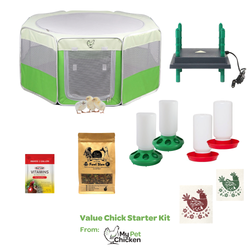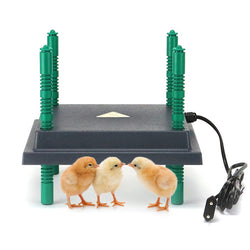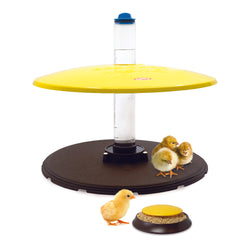Heat Acidosis/ Heat Stress in Chickens: Symptoms, Treatment, and Prevention
Back to blog
Recognizing Heat Stress and Acidosis in Chickens
Summer is in full swing with extreme heat waves sweeping the country. While chickens and other poultry manage heat well these scorching temperatures can lead to heat stress. It's critical for those caring for poultry, such as chickens, to identify the telltale signs of heat stress. Heat stress in chickens can be quite serious, leading to a condition known as heat acidosis. This is a stress-induced condition where chickens can’t regulate their body temperature due to the high temperatures. If heat stress isn't prevented, it can lead to significant impacts on your chickens overall health and productivity.
The signs of heat stress in chickens and other poultry are usually quite clear. Chickens suffering from heat stress often exhibit behaviors such as panting, spreading wings, squatting low to the ground, reduced intake of feed, a decrease in egg production, weight loss, and increased thirst. They may also show signs of dehydration and weak, sluggish movements. If these signs are observed, it's imperative to begin a treatment course and take preventative measures to protect the rest of your poultry from heat stress.

Understanding the Impact of Hot Temperatures on Birds: The Connection between Heat Stress, Acidosis, and Alkalosis in Poultry
Heat stress in birds is linked to hot temperatures, often resulting in damaging effects on the body. Birds can't sweat as humans do, which makes cooling off in hot climates very challenging. In chickens, panting is a mechanism they use to regulate their body temperature, especially when they are exposed to high temperatures or during times of stress.
When they pant, they breathe rapidly and take in more oxygen while expelling carbon dioxide through their respiratory system. Under normal circumstances, this helps cool down their bodies and maintain proper gas exchange. However, excessive panting, especially in hot and humid environments, can lead to a significant loss of carbon dioxide, which disrupts the balance of acid and base (pH) in the blood. The elimination of too much CO2 results in a decrease in blood pH, making it more acidic. This condition is known as respiratory acidosis.
On the other end of the spectrum, alkalosis, the exact opposite condition of acidosis, can also be triggered by hot temperatures. Respiratory alkalosis occurs when there is an excessive loss of carbon dioxide (CO2) from the body due to increased breathing rate or hyperventilation. Chickens may experience respiratory alkalosis if they are subjected to stress, excitement, or heat, which can cause them to breathe rapidly.
Symptoms of Alkalosis may include:
- Rapid and shallow breathing
- Restlessness
- Muscle twitching or spasms
- Decreased egg production
- Weakness or lethargy
- Reduced appetite
- Changes in behavior and posture
Acidosis or alkalosis in chickens can have dangerous negative effects on their health, including:
- Decreased blood flow to vital organs: Vasoconstriction, the narrowing of blood vessels, which can reduce blood flow to vital organs like the brain, heart, and kidneys.
- Impaired enzyme function: pH imbalances in the blood can interfere with enzyme function, affecting various physiological processes in the body.
- Altered electrolyte balance: Both acidosis and alkalosis can disrupt the balance of electrolytes (such as potassium, calcium, and sodium) in the blood, which is critical for proper nerve and muscle function.
Treating Heat Stress and acidosis in Chickens
While prevention is always the best medicine, sometimes the situation may be out of your control. If any of your birds are showing symptoms of heat stress here is what you can do to help them.
- Move to a Cooler Environment: Immediately transfer the affected chickens to a cooler and shaded area to help them cool down. Avoid exposing them to direct sunlight or high temperatures during treatment. Bringing them into an air conditioned house or car may can help greatly.
- Provide Fresh Water: Offer a constant supply of clean and cool water to ensure proper hydration. Heat stress and panting can lead to dehydration, which exacerbates acidosis. Adding electrolyte supplements to their water can also help replenish essential minerals.
- Electrolyte Solutions: Administer electrolyte solutions orally to dehydrated or severely affected chickens. These solutions help restore the balance of electrolytes and aid in rehydration.
- Reduce Stress: Minimize stress factors that may exacerbate heat acidosis. Keep the chickens calm and avoid overcrowding in the coop or run.
- Limit Physical Activity: Encourage rest and limit physical activity during the hottest parts of the day. This helps reduce the production of metabolic heat and allows the chickens to recover.
- Adjust Feeding: Offer a balanced and easily digestible diet to minimize metabolic heat production. Adjust feeding schedules to provide food during cooler periods.
- Monitor Closely: Keep a close eye on the affected chickens and monitor their progress. Look for improvements in their behavior, breathing rate, and overall general health.
- Seek Veterinary Attention: If the symptoms persist or worsen despite your efforts, seek immediate veterinary attention. A veterinarian with experience in poultry care can provide a more accurate diagnosis and tailored treatment plan for your chickens, such as cooled IV fluids.
Heat Stress Prevention in Chickens
Now that you’ve learned about heat stress and its symptoms, let's go over all the ways you can keep your birds cool and safe this summer!
1. Provide Ample Shade and Proper Ventilation: One of the most critical factors in preventing heat stress is offering ample shade and proper ventilation in the chicken coop and run. Ensure that the coop is strategically positioned to receive shade from trees or buildings during the hottest parts of the day. We love growing loofah (or other vining plants) over chicken runs to provide shade. Additionally, install vents and windows to allow hot air to escape, maintaining a fresh airflow for the chickens.
2. Keep the Coop Well-Insulated: Proper insulation can regulate the temperature inside the coop, keeping it cooler during hot weather. Insulate the walls and roof of the coop to reduce heat absorption from the sun and minimize tempurature fluctuations.
3. Create a Dust Bath Area: Dust baths are not only essential for maintaining chicken hygiene but also for cooling down. Chickens instinctively enjoy taking dust baths to clean their feathers and regulate their body temperature. Provide a designated dust bath area with dry soil, sand, and diatomaceous earth for them to enjoy.
4. Ensure an Abundant Water Supply: Water is the key to preventing dehydration and heat stress in chickens. Make sure there is a constant supply of fresh, cool water available in multiple locations within the coop and run. Consider using larger water containers to reduce the frequency of refills during hot days.

5. Use Frozen Treats: A creative way to keep chickens cool is by offering frozen treats. Freeze fruits, vegetables, or even yogurt in ice cube trays, and place them in the coop or run. The chickens will enjoy pecking at the treats while also getting some relief from the heat. Check out our favorite summer treats for chickens.
6. Provide Wading Pools: Chickens, like many other birds, enjoy splashing around in water. Offer shallow wading pools or low containers filled with water to create a fun and refreshing space for them to cool off.
7. Adjust Feeding Schedules: During extremely hot weather, consider adjusting your chickens' feeding schedule. Offer food during the cooler parts of the day to encourage more substantial feed intake and reduce metabolic heat production during peak temperatures.
8. Limit Stressful Activities: Avoid overcrowding or introducing new birds during hot weather, as these can cause stress and exacerbate heat-related issues. Keeping the flock calm and relaxed will aid in reducing heat stress.
9. Monitor Behavior Closely: Be observant of your chickens' behavior and look for signs of heat stress, such as excessive panting, holding wings away from the body, or reduced activity. Early detection allows for timely intervention and prevention of more severe issues.
These measures can help ensure your birds have a happy, cool, and safe summer!
As the sweltering heat takes its toll on both you and your feathered friends, it's essential to ensure you have a comprehensive plan in place to help keep your chickens cool and comfortable. Providing ample shade, cool and clean water, electrolyte supplements, and a dust bath area can go a long way in preventing heat stress and heat acidosis. Regularly monitor your chickens for any signs of distress and be prepared to take immediate action if needed. Heat stress can be a serious and potentially life-threatening condition, but with proper care and attention, you can ensure your flock thrives even in the hottest months.



